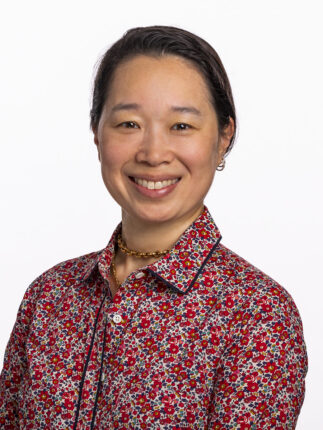

Michelle Chang
Contact:
Michelle Chang
A. Barton Hepburn Professor of Chemistry
[email protected]
Frick Laboratory, 385
609-258-7535
Faculty Assistant:
Lisa Piscatelli
Faculty/Grants Assistant
[email protected]
Frick Laboratory, 228
609-258-6843
Research Focus
To reach Professor Chang, please use this email: [email protected].
Biocatalysis, Natural Products Discovery, Chemical Biology, and Synthetic Biology — Designing new biosynthetic pathways for synthesis of small molecules
Our research laboratory works at the interface of enzymology and synthetic biology to address problems in human health and the environment. We are interested in the discovery, characterization, and engineering of new enzymes and biosynthetic pathways as an approach to develop new biocatalytic methods to generate molecular diversity and synthesize diverse small molecule targets. A unifying theme of our projects is a focus on gaining a detailed mechanistic understanding of how enzymes and metabolic pathways function to provide new avenues for engineering function.
Biocatalysis and enzyme mechanism
The ability to synthesize molecules of interest has transformed human society at many levels. Our lab is interested in taking advantage of the ability of enzymes to catalyze challenging reactions with high stereo- and site selectivity under mild conditions. We study metalloenzymes that carry out selective C-H activation chemistry to achieve a variety of downstream functionalization ranging from halogenation to addition of variety of other groups. Towards this goal, we are also interested in mechanistic studies that allow us to better understand how these unusual reactions work and to provide new insight into expanding their reaction scope. We are also interested in the discovery of new metalloenzymes and other enzymes that catalyze key transformations such as C-C bond or amide bond formation and engineering their use for biocatalysis and chemical biology applications.
Natural product discovery and engineering
Natural products and their scaffolds continue to provide a rich source for the discovery and development of new therapeutics. We are interested in the discovery of new biosynthetic pathways to access enzymes and small molecule scaffolds with new functional groups, architectures, and bioactivity. We have been specifically interested in engineering the production of fluorinated natural products as well as alkaloid natural products derived from amino acids. These pathways can then be engineered to produce both pharmacophores of interest, such as site selectively modified heterocycles, as well as to provide more complex modified peptides and proteins for bio-orthogonal chemistry.
Synthetic biology
Living systems have solved many important challenges in chemistry, ranging from carbon and nitrogen fixation to the degradation of waste. Our group is interested in the metabolic engineering of different cell processes in order to carry out chemical synthesis in living cells by microbial fermentation. We have focused on engineering pathways for biofuel and biodegradable plastic in living cells as well as those for assimilation of carbon dioxide via non-photosynthetic carbon fixation.
Honors
- National Science Foundation Predoctoral Fellow (1997-2000)
- M.I.T./Merck Foundation Predoctoral Fellow (2000-2002)
- Ph.D. Massachusetts Institute of Technology (2004)
- Jane Coffin Childs Postdoctoral Fellow, University of California, Berkeley (2004-2007)
- Camille and Henry Dreyfus Foundation New Faculty Award (2007)
- Arnold and Mabel Beckman Foundation Young Investigator Award (2008)
- Technology Review TR35 Young Innovator Award (2008)
- BayBio Rising Star Award (2008)
- NSF CAREER (2009)
- Agilent Early Career Award (2010)
- Hellman Foundation Faculty Award (2010)
- American Chemical Society-Sociedade Brasileira de Química Young Talents in Science Award (2011)
- NIH New Innovator Award (2011)
- DARPA Young Faculty Award (2012)
- Iota Sigma Pi Agnes Fay Morgan Award (2012)
- Paul Saltman Award in Bioinorganic Chemistry (2013)
- 3M Young Faculty Award (2013)
- Camille Dreyfus Teacher-Scholar Award (2013)
- Arthur Cope Scholar Award (2015)
- Pfizer Award in Enzyme Chemistry (2016)
- Royal Society of Chemistry Centenary Prize (2022)
- Margaret Faul Award for Women in Chemistry (2023)
- ACS Award for Creative Work in Fluorine Chemistry (2024)
Selected Publications
M.E. Neugebauer, E.N. Kissman, J.A. Marchand, J.G. Pelton, N.A. Sambold, D.C. Millar, and M.C.Y. Chang*, “Conversion of a radical hydroxylase into a halogenase through reaction pathway engineering”, Nat. Chem. Biol. 2022, 18, 1171–179.
S. Sirirungruang, O. Ad, T.M. Privalsky, S. Ramesh, J.L. Sax, H. Dong, E.E.K. Baidoo, B, Amer, C. Khosla, and M.C.Y. Chang*, “Engineering site-selective incorporation of fluorine into natural product analogs”, Nat. Chem. Biol. 2022, 18, 886-893.
K. Thevasundaram, J.J. Gallagher, F. Cherng, and M.C.Y. Chang*, “Engineering non-photosynthetic carbon fixation for production of bioplastics by methanogenic archaea”, Proc. Natl. Acad. Sci. U.S.A. 2022, 119, e2118638119.
Z.Q. Wang, H. Song, E.J. Koleski, N. Hara, D.S. Park, G. Kumar, Y. Min, P.J. Dauenhauer, and M.C.Y. Chang*, “A dual cellular-heterogeneous catalyst strategy for the production of olefins from glucose”, Nat. Chem. 2021, 13, 1178-1185.
M.E. Neugebauer, K.H. Sumida, J.G. Pelton, J.L. McMurry, J.A. Marchand, and M.C.Y. Chang*, “A new family of radical halogenases for the engineering of amino acid-based products”, Nat. Chem. Biol. 2019, 15, 1009-1016.
J.A. Marchand, M.E. Neugebauer, M.C. Ing, C. Lin, J.G. Pelton, and M.C.Y. Chang*, “Discovery of a pathway for terminal-alkyne amino acid biosynthesis, Nature 2019, 567, 420-424.
